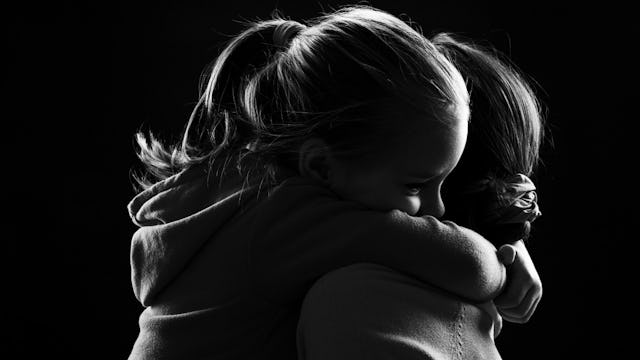How Parenthood Affects My PTSD

It is 7:30 in the evening or, as I like to call it, bath hour. Bed hour. The witching hour. My daughter runs around the house — hopped up on sugar, adrenaline, and “I’m not sleepy” energy — and my husband runs after her. He tells her it is time to go potty.
It is time to get ready for bed.
But, like any good four-year-old, she doesn’t listen. She keeps moving and screaming and laughing until my husband snaps.
Until he breaks.
“Mia,” he shouts, “bathroom. Now.” And, after a whimper or two, she obliges. She shouts back “okay.” But while their fight over — while the matter is resolved — the fight within me is just beginning. I am sweating. I am shaking. I am struggling to breath.
That’s because I am one of five million Americans who struggles with PTSD, or post-traumatic stress disorder, and one of my triggers is yelling. Raised voices put me on edge.
Of course, when most people think of PTSD they think of soldiers — warzones and gunfire, brutality and blood — but according the United States Department of Veteran Affairs, individuals can develop PTSD “after experiencing or witnessing a [number of] life-threatening event, like combat, a natural disaster, a car accident, or sexual assault.” And mine? Mine was caused by the latter, and by abuse. A long, long history of abuse.
You see, when I was a child, I was verbally abused. My mother mocked me and ridiculed me and made me feel like a failure. Like I was less than. As a teenager, I was sexually abused not by strangers, but by a friend, by a man I called my boyfriend. And my adult life has been peppered with trauma: I have been beaten, punched, pushed, and choked. And while many things can trigger me — bath time makes me anxious and criticism makes me shut down — it is the yelling that rattles me.
Screaming throws my body into high alert.
My hands tremble. My legs shake. My heart pumps hard and fast — so hard I fear it may tear though my chest. And I struggle to catch my breath.
I want to flee.
I find myself searching for outs. For doors.
And I stay in this hypersensitive state for several minutes. For hours. For what feels like a never ending series of days.
Of course, before I became a mom, things were easier. Not great, but easier — when things got intense I could avoid my triggers, and shift my focus away from my triggers. I could go on a walk or a run. I could call a friend. But now? Now I have to see my triggers, and feel with my triggers. I have to hear them, and deal with them, because parenting — in and of itself — is a trigger.
My trigger is my child.
I do not blame my husband or my daughter; it is simply a fact. It is a part of my life.
But it isn’t just their tones which bother me, it is my own. Yes, there are times when I lose my cool. When I raise my voice. And those are some of the hardest moments because I am not only thrown into a PTSD-like state, I am thrown into a veritable sea of guilt for being a bad person. A bad parent. A bad mom. A verbally abusive mom.
Make no mistake: I know there is a difference between me and my own mother. I know my words and actions are not the same, but I do not want my daughter to go through what I have gone through.
I do not want her to ever feel the same.
And so I fight. Everyday I work to do what is right. And I work hard to heal myself so I can be the good parent, the present parent, the loving parent she deserves.
Will I ever be healed? Maybe, but probably not. I fear my past will always be a part of me. My triggers will always be a part of who I am. But I am healing. Slowly. Surely. With patience, perseverance, and therapy. Lots of therapy. And that is all can do.
Today, I choose fight not flight.